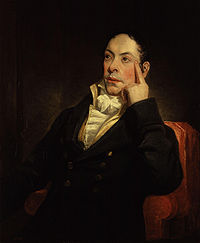Many readers of Regency-era literature recognize the name “Monk” Lewis.
But who the devil was the fellow?
Matthew Gregory Lewis (1775 – 1818) was the son of a wealthy Jamaican planter. His mother ran off with the music teacher when her son was six. He later supported her financially and socially, and then she became lady-in-waiting to the Princess of Wales.
His success was almost entirely dependent on his classic tale of The Monk. This was the Gothic poem of a holy man’s descent into depraved evil.
She sealed his lips with a wanton kiss;
‘Though I forgive your breaking your vows to heaven,
I expect you to keep your vows to me.’
It was an astonishing success, all the more so because the author was not of age. The first edition was followed by a second and third. The most objectionable passages were edited out for having caused much grief to his family. Someone said of Lewis, and perhaps others:
“Twenty is not the age at which prudence is most to be expected.”
He never married. When he came into his fortune, the aristocrats who had previously welcomed him into their salons–the Hollands, Lansdowne and others–now despised him. Lewis pouted at first, reading during dinner and criticizing the company to be had at Oatlands.
Oh! Wonder-working Lewis! Monk, or Bard
Who’d fain would make Parnassus a church-yard
Lo, the wreaths of yew, not laurel, wreath thy brow
Thy Muse a Sprite! Apollo’s sexton, Thou!
—-Byron in English Bards and Scotch Reviewers
Even his fellow poets attacked him, and over one work alone. What was it about The Monk that attracted such great vitriol?
The work was a morality plot, normally despised by the young, but delivered so cleverly that even Austen’s Northanger Abbey was bound to mention it as the best thing since Tom Jones. All harkened to it like a Pied Piper with its horrific plot and violent supernaturalism. Rape, live burial, grisly murder and the downfall of the once-sanctified and now defiled. These lurid themes became interwoven in a new genre–the Gothic tale.
It was all Lewis was ever known for. But it was enough.



I did an independent study in grad school on Gothic literature and read The Monk. I thought it was fantastic (I’m a Stephen King fan BTW) and wondered by people didn’t still read it. I’ll have to go back and re-read it now you’ve reminded me of it. It certainly was head and shoulders above the rest of its genre for the time. 🙂 Loved this post, Angelyn!
LikeLike
I quite agree with that assessment, Jenna—the gothic tale needs to revisit its roots from time to time.
LikeLike
How sad that he was abandoned by everyone. What a great talent.
LikeLike
I can’t think they abandoned him because his fortune was built upon slave labor. Rather, I believe they were all envious of such early talent.
LikeLike
Reblogged this on The Things That Catch My Eye and commented:
Another Regency Personality, Engelyn comes through again, and well worth checking out.
LikeLike
Many thanks, David.
LikeLike
I love gothic tales and I especially like this blog.
LikeLike
I’m so glad! Thank you!
LikeLike
Pingback: Monk Lewis: "thy skull discern a deeper hell" by Angelyn Schmid | The Beau Monde
Pingback: Hearts Through History Romance Writers
Pingback: Regency Apparition | Angelyn's Blog